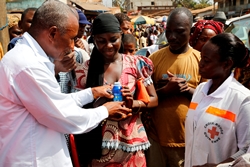
Ebola continues to claim lives in West Africa. As of April11, Guinea had counted close to 160 suspected cases with 104 deaths. The virus which surfaced in rural Guinea and then spread to Conakry, the capital, has now also reached neighbouring Liberia, where five cases have been confirmed. In Mali, health officials are investigating suspected cases of Ebola. Concerns raised about its potential to spread further have prompted Senegal, Sierra Leone and Cote d’Ivoire to reinforce their epidemiological surveillance systems and to focus on preparedness activities. Many international aid organizations, including the Red Cross, are scaling up their efforts to combat the spread, by releasing emergency funds and deploying health teams to the region.
In Guinea, where the first cases were reported, Red Cross volunteers are organizing education and awareness campaigns in the most at-risk communities to teach people how to prevent the spread of the disease, while trying to reduce the fear and stigma attached to it. They are also involved in disinfecting the homes of confirmed cases, removing dead bodies, identifying and tracking those who have come into contact with suspected cases and providing psychosocial support to affected families. In neighbouring Liberia, the Red Cross is also training and mobilizing volunteers in the most at-risk counties.
Using technology to reach communities
In Sierra Leone, which borders Guinea on the northeast, and where there has not been any suspected Ebola case reported, the Red Cross is using text messaging to raise awareness about Ebola prevention in the four districts sharing borders with Guinea. To date, these messages have reached more than 2 million people. It follows a successful campaign during a cholera outbreak in Sierra Leone last year, during which the Red Cross used text messages to provide people with the knowledge and tools they needed to protect themselves and their families. The result was a drastic reduction in the number of cholera cases.
To date, the Canadian Red Cross, with support from the Government of Canada, has contributed funds and two aid workers to the area. Additional personnel remain on standby, ready to be deployed in the coming weeks as needed.